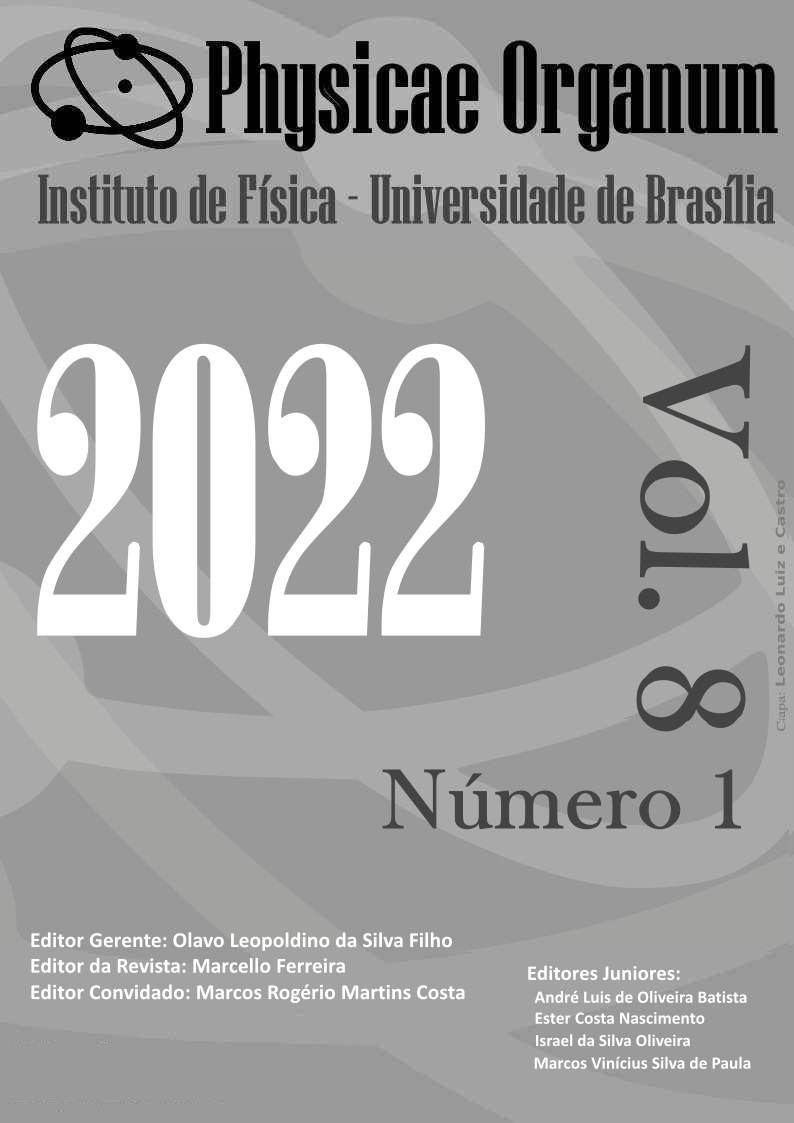EARTH’S SHAPE
AN INVESTIGATIVE TEACHING ABOUT EVIDENCES OF THE SPHERICITY OF THE EARTH WITH STUDENTS FROM MIDDLE SCHOOL
DOI:
https://doi.org/10.26512/2446-564X2022e42259Keywords:
Astronomy, Flat Earth, Inquiry-based Teaching, Elementary SchoolAbstract
The antiscience narratives have spread lately in different media. The flat-earth movement, one of these narratives, is a conspiracy and negationist movement that has been organized and spread in virtual environment, and their main characteristics are the science negationism and the attack on science education. The Brazilian national curriculum and the curriculum of Distrito Federal predicts the study of the Earth’s shape and the scientific evidences that proves the geoid shape in elementary school. In this context, this research analyzed the application of an investigative teaching sequence with 6th grade students of a public elementary school in Distrito Federal - Brazil with the goal of investigating the evidence of the Earth’s shape and illustrating them through the elaboration of didactic models. Although most students (80%) consider the Earth's shape spherical, most of them couldn’t justify it (65%) before the investigative sequence. Despite the limitations due from the Covid-19 pandemic in the educational context, the students produced didactic models with accessible supplies to illustrate the scientific evidences of the Earth’s shape previously investigated and discussed in class.They were also able to identify evidences from the geoid shape of Earth and the contradictions of the flat-earth movement. Therefore, this investigative teaching sequence proved to be an important didactic strategy to investigate Earth’s shape in the school environment through the development of argumentative practices that deconstructs scientific denialism, minimizing its damage to society as a final social practice.
Downloads
References
ALBUQUERQUE, Afonso de; QUINAN, Rodrigo. Crise epistemológica e teorias da conspiração: o discurso anti-ciência do canal “professor terra plana”. Revista Mídia e Cotidiano, v. 13, nº 3, p. 83-104, dez. 2019.
BERTOTTI, Thalyta Gonçalves. Como lidar com a popularização do terraplanismo? Uma proposta a partir da filosofia da ciência de Susan Haack. Revista Eletrônica de Filosofia, v. 17, nº 2, p.196-207, 2020.
BONFIM, Carolina Santos; GARCIA, Pedro Maciel de Paula. Investigando a “Terra plana” no YouTube: contribuições para o ensino de Ciências. Revista de Ensino de Ciências e Matemática, v. 12, nº 3, abril - junho, 2021.29
BRASIL. Ministério da Educação. Base Nacional Comum Curricular. Brasília, 2018.
CARVALHO, Ana Maria Pessoa de. O ensino de Ciências e a proposição de sequências de ensino investigativas. In: Ensino de Ciências por investigação: Condições para implementação em sala de aula. Ana Maria Pessoa de Carvalho (org.). São Paulo: Cengage Learning, 2013.
CARVALHO, Ana Maria Pessoa de. Fundamentos teóricos e metodológicos do Ensino por Investigação. Revista Brasileira de Pesquisa em Educação em Ciências, v. 18, n. 3, p. 765-794, 2018.
CATARINO, Giselle Faur de Castro; REIS, José Cláudio de Oliveira. A pesquisa em ensino de ciências e a educação científica em tempos de pandemia: reflexões sobre natureza da ciência e interdisciplinaridade. Ciência & Educação, Bauru, v. 27, e21033, 2021
CHRISPINO, Alvaro; BRAÑAS DE MELO, Thiago; BENGIO DE ALBUQUERQUE, Márcia. O crescimento da anticiência na Pandemia: Um quadro de luz e sombra. Educación Química, número especial, 2020.
COELHO, Leandro Jorge; LIPORINI, Thalita Quatrocchio; PRESSATO, Daiany. A importância do ensino de ciências no contexto da pandemia no Brasil: proposições fundamentadas na pedagogia histórico-crítica. Momento: diálogos em educação, EISSN 2316-3100, v. 30, n. 01, p.147-172, jan/abr, 2021.
CUNHA, Leandro Ferreira Farias da; SILVA, Alcineia de Souza; SILVA, Aurênio Pereira da. O ensino remoto no Brasil em tempos de pandemia: diálogos acerca da qualidade e do direito e acesso à educação. Revista Com Censo: Estudos Educacionais do Distrito Federal, Brasília, v. 7, n. 3, p. 27-37, ago. 2020.
DISTRITO FEDERAL. Secretaria de Estado de Educação do Distrito Federal. Currículo em Movimento do Distrito Federal: Ensino Fundamental anos iniciais - anos finais, 2018.
FADDOUL, Marc; CHASLOT, Guillaume; FARID, Hany. A Longitudinal Analysis of YouTube's Promotion of Conspiracy Videos. CoRRabs/2003.03318. 2020.
GASPARIN, João Luiz; PETENUCCI, Maria Cristina. Pedagogia Histórico-Crítica: da teoria à prática no contexto escolar. Paraná: 2008. Disponível em http://www.diaadiaeducacao.pr.gov.br/portals/pde/arquivos/2289-8.pdf. Acesso em: 29 de maio de 2021.
JUSTINA, Lourdes Aparecida Della; FERLA, Márcio Ricardo. A utilização de modelos didáticos no ensino de Genética – exemplo de representação de compactação do DNA eucarioto. Arquivo Mudi, v. 10, nº 2, p. 35-40, 2006.
LANG, Fernando da Silveira. Sobre a forma da Terra. Física na Escola. v. 15, p. 4-14,30 2017
Downloads
Published
How to Cite
Issue
Section
License
Copyright (c) 2022 Physicae Organum

This work is licensed under a Creative Commons Attribution-NonCommercial-ShareAlike 4.0 International License.
Autores que publicam nesta revista concordam com os seguintes termos:
- Autores mantém os direitos autorais e concedem à revista o direito de primeira publicação, sendo o trabalho simultaneamente licenciado sob a Creative Commons Attribution License o que permite o compartilhamento do trabalho com reconhecimento da autoria do trabalho e publicação inicial nesta revista.
- Autores têm autorização para assumir contratos adicionais separadamente, para distribuição não-exclusiva da versão do trabalho publicada nesta revista (ex.: publicar em repositório institucional ou como capítulo de livro), com reconhecimento de autoria e publicação inicial nesta revista.
- Autores têm permissão e são estimulados a publicar e distribuir seu trabalho online (ex.: em repositórios institucionais ou na sua página pessoal) a qualquer ponto antes ou durante o processo editorial, já que isso pode gerar alterações produtivas, bem como aumentar o impacto e a citação do trabalho publicado (Veja O Efeito do Acesso Livre).




